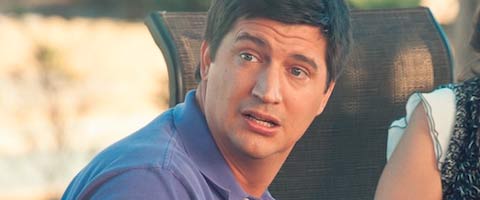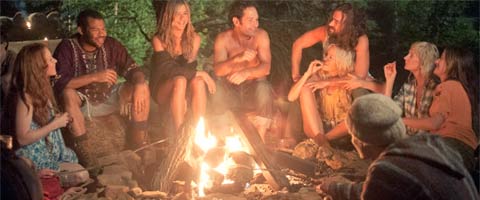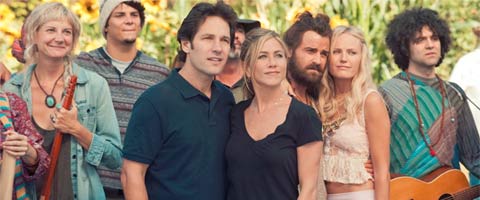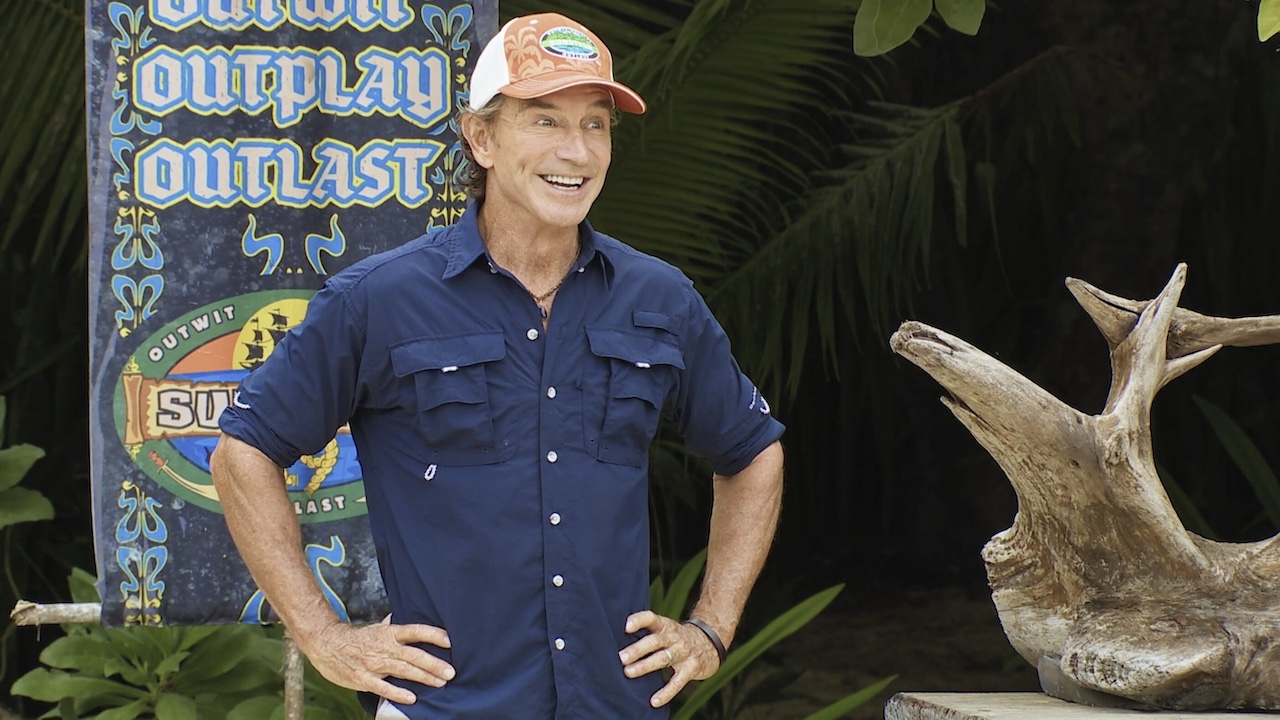Ken Marino Talks Putting The Ego Aside For Comedy In Wanderlust

When you have a cast as talented as the one featured in Wanderlust, you know there’s going to be a lot of improvisation. In their previous films, actors like Paul Rudd, Kathryn Hahn, Kerri Kenney, and Joe Lo Truglio have demonstrated that they can be at their most hilarious when they aren’t sticking to the script. But how does that affect the writers, who worked hard to develop scenes on the page? For Ken Marino, who wrote the script for the upcoming comedy with director David Wain, the key is balance.
I was recently granted the great opportunity to sit down with Marino to talk about Wanderlust, which arrives in theaters tomorrow. In addition to talking about improv, we also discussed how the story originated, the way he ended up playing the role of Paul Rudd’s brother, Rick, and how he views both the writing and acting sides of his career.
I can’t say that I’ve ever seen a comedy set in a hippy commune before, so where exactly did this idea come from?
I think it was an idea that Dave had, he just wanted to do something about a commune. He talks about how The State was this communal process of creating ideas and there was no one person or one leader who made decisions, and Dave was affected very strongly by camp and things like that. And we both really loved this movie, Together. It’s a foreign film. Have you ever seen that?
No, I haven’t.
It’s great. It’s about a commune in the 70s and these people living in this house in more of a suburban area. And that kind of sparked it. That kind of got us thinking about, “That would be a fun place to do a story and create this ensemble comedy of all these odd people who are on the outskirts of how people live. And then as we were writing we realized that we probably needed an in – like a couple of normal people dropping in and experiencing it. And so then we started exploring what’s going on today and how people are a little overly ambitious with their finances and how people are losing their homes and “what would you do?” How could we thrust somebody into a commune? So that was kind of the seed of it. We just thought that it would be a fun world to explore.
Talking about that sense of community, if you watch the other films that you have made with David Wain there are always tons of recognizable faces, and just about all of them are back for Wanderlust. Did you write these characters for specific actors?
Your Daily Blend of Entertainment News
We definitely had Paul [Rudd] in mind, we had Justin [Theroux] in mind, for Seth. Actually, he was originally called “Justin.” You’re always thinking about Kerri Kenney’s voice, when we wrote it we were like, “That sounds like Kerri.” We just thought how she would deliver something. So we had certain people in mind and then some characters we wrote, didn’t know who we wanted, but then after we got it greenlit we started thinking about, “Okay, who would be great for this?” And we saw a lot of people for Wayne, or we started thinking about a lot of people for Wayne. And then we’re like, “Let’s give it to Joe [Lo Truglio]! Joe is funny and he’s gonna rock it!” Go straight to the guy who is going to shave his head and he’ll embrace it fully! He has that sweetness and it was important to make Wayne lovable and you can’t get more lovable than Joe.

And how about yourself? Were you always going to play Rick?
No, at first we were just writing it and the way that Dave and I write, we sit in a room together and he usually types and we act it out and we play different parts and talk about it. Certainly the voice of that guy came easy to me, so I was throwing out a lot of lines for him. But we weren’t talking about me playing him. And then when Paul read it he was like, “Ken’s going to play Rick, right?” And then I was like, [low grumbling] “Maybe I should play Rick.” At first I was like, “Who are we going to get for Rick?” but I guess maybe in the back of my head I was thinking I’d like to play Rick.
After you decided to take it on, did you kind of beef up the role at all?
No! Actually, we pulled back on it. In the draft that got greenlit that we were moving forward with Rick had a little more of an arc. He wasn’t just kind of a blowhard the whole time. He got kicked out of his house and he and George wound up at a seedy hotel because they had nowhere to live. So they were living at the hotel and then George wakes up and I’m having sex with a prostitute [laughs]. And then he’s like, “You make it very difficult to root for you!” And then something happens that sparks George to get up and he takes my car and I jump in the car with him and then we have this kind of heart-to-heart on the way to the commune. And then he’s like, “Stop being a dick and be my brother and let me use your car!” So then I go to the commune, and we actually shot a version where I, at the end, end up living at the commune, because I have nowhere to go. And I wind up with Karen, played by Kathryn Hahn. But then shooting it, it took too long – we actually didn’t shoot that scene at the hotel because as we were writing it we were like, “We gotta get him back sooner.” It’s the third act and we can’t create this whole other scene at this whole other place. Hindsight, I wish we would have shot it to see how it played out, but him running down the street is a solid end for him.
Do you have a preference between writing and acting?
I always wanted to act. I just stumbled upon the, for lack of a better phrase, the acting bug, or whatever you call it, at a very young age. So I always wanted to do it and I enjoy it. I don’t like the business end of it, because it’s really hard. There’s a lot of rejection. And writing, you have a little bit more control over that, that’s your baby. Of course that has to get produced and somebody has to give you money to do that. So I like both. Do I prefer one over the other? No, they both have their pros and cons. I like doing all of it. Dave and I produced this movie and we’ve been involved in producing a number of other things we’ve been working on lately. I enjoy that, I enjoy being involved and on that end because maybe I like to have a little bit more control over what’s going on. And that’s why I like directing. I’ve been directing a little bit, I enjoy that. I have a good time doing it.

To talk a bit more about the writing side, one thing I’m always curious about with projects like this, with casts filled with great comedians and improvisers, does the writing process ever really end, or are you just adding and taking away constantly through production?
I think even in post you’re creating things, you’re building stuff that maybe wasn’t even there. You’re taking a sound bite from that take and this take and kind of creating a whole other kind of delivery of something. So yeah, it’s never ending. That’s why last night [at the premiere] was very cathartic for me, because it’s been a long process and to sit back and be like, “Okay, now there’s nothing we can do. That’s the movie, enjoy it!” There were a couple of times I was like, “Oh! Why did we cut that line?! That line would have killed tonight!” But it was very cathartic last night because we’re done with it. But the process, the short answer followed by my long answer, is that no, it doesn’t end. You write it, you do the text, and then you let talented actors improvise and go in different directions, and that only elevates the material.
When it comes to improvisation, do you have to kind of put your ego aside?
No, I guess I see it from both ends, being an actor and a writer. So I always want, as a writer, for the actors to do the text, because we spent a lot of time honing it and trying to figure out the best way to say it. But then I know as an actor that if I put a handle on something and I can make it a little better, that seed of an idea. I can go off on a tangent and those little moments of first-time saying it, there’s a little extra energy or kind of spark behind it and you surprise people. And when you’re in a scene with somebody and you surprise them, and then they say something that you didn’t expect, all of that is magic and you want to grab that stuff. My feeling is do the text, work it out a little bit, and break from the text and go wherever you want inspired by the text.
I do also want to ask about the status of the Party Down movie, because I’m a huge fan of the show.
You know, you’re guess is as good as mine. I know this, that they are working on a script, that there are people who are interested in doing it, but until I’m there on set I wouldn’t commit to saying that it’s happening, you know?
Are you interested in jumping back into the Ron Donald character?
Oh my god, yeah! I love Ron Donald and I love all the people who worked on that show. That was a magical experience for me. And working with Adam [Scott] and Lizzy [Caplan] and Martin [Starr] and Ryan [Hansen] and Megan [Mullally] and Jane [Lynch] and John Enbom…everybody was just amazing, so to get a chance to play with those people one more time would be phenomenal.

Eric Eisenberg is the Assistant Managing Editor at CinemaBlend. After graduating Boston University and earning a bachelor’s degree in journalism, he took a part-time job as a staff writer for CinemaBlend, and after six months was offered the opportunity to move to Los Angeles and take on a newly created West Coast Editor position. Over a decade later, he's continuing to advance his interests and expertise. In addition to conducting filmmaker interviews and contributing to the news and feature content of the site, Eric also oversees the Movie Reviews section, writes the the weekend box office report (published Sundays), and is the site's resident Stephen King expert. He has two King-related columns.
